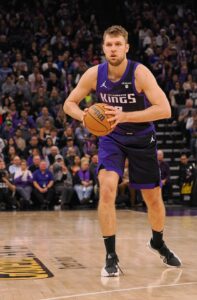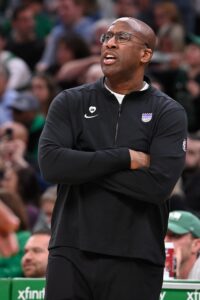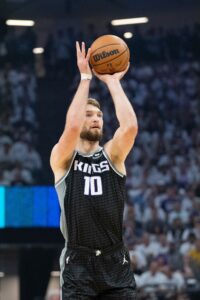For the second time in three years, the Sixers opened their season with a major trade request hanging over the team. Unlike in 2021/22, when the acrimonious Ben Simmons saga dragged out all the way to the February trade deadline, Daryl Morey was able to resolve James Harden‘s trade demand early in the fall, reaching an agreement during the second week of the regular season to send the former MVP to the Clippers in exchange for a package of role players and draft picks.
It’s highly unlikely that any of those future draft picks will ever turn into a player of Harden’s caliber, and none of the four veterans sent to Philadelphia in the swap figure to be long-term keepers. But with a disgruntled player on a pricey expiring deal, the 76ers didn’t have much leverage in trade talks and did well to acquire players who fit the roster in the short term and assets that could be flipped in future moves — one of the players Philadelphia received from L.A., Marcus Morris, was sent out at the trade deadline in a deal for Buddy Hield, for instance.
Perhaps even more important than the assets the Sixers got for Harden was the opportunity his exit created for fourth-year guard Tyrese Maxey. With Harden no longer in the picture, Maxey saw his usage rate increase to a career-high 28.0% and responded by posting new career bests in points (25.9), assists (6.2), and rebounds (3.7) per game, among other categories. His scoring efficiency took a hit, but his .450/.373/.868 shooting line was still just fine, and the 23-year-old was named the NBA’s Most Improved Player for his star turn.
Maxey already looked like a future building block in Philadelphia, but his 2023/24 performance proved he’s capable of being a legitimate No. 2 to former MVP Joel Embiid. The Sixers had a 29-7 record in the games those two played together and outscored opponents by +12.4 points per 100 possessions when they shared the court.
Unfortunately, Embiid’s injury issues flared up again, with a meniscus tear limiting him to 39 regular season games and reducing his mobility and effectiveness in the postseason. For the first time since 2020, the 76ers didn’t win a playoff series this spring, but that early postseason exit wasn’t cause for panic, since the front office had already anticipated making major roster changes during the offseason.
Having dumped P.J. Tucker‘s contract in the Harden trade, the Sixers will head into this summer with only one guaranteed contract (Embiid) on their cap for 2024/25 and Maxey poised to re-sign as a restricted free agent. Besides those two players, no one else who finished the season with Philadelphia is a lock to be back in the fall.
That’s a lot of uncertainty entering an offseason, which is a little scary, but the duo of Embiid and Maxey is a great place to start. So even if the Sixers miss out on their top target(s) and have to turn to Plan B or C, they’re well-positioned to take a step forward following a 47-35 season in ’23/24.
The Sixers’ Offseason Plan
 Taking into account Embiid’s salary, Maxey’s cap hold, the cap hold for the No. 16 overall pick, and rookie-minimum cap holds for nine empty roster spots, the Sixers could generate up to about $62MM in cap room. That figure, which would rely on renouncing all the team’s current free agents and waiving players on non-guaranteed salaries (including Paul Reed), could rise to nearly $65MM if Philadelphia also trades away its draft pick. The club will be able to go over the cap to re-sign Maxey to a maximum-salary contract after it uses up its room.
Taking into account Embiid’s salary, Maxey’s cap hold, the cap hold for the No. 16 overall pick, and rookie-minimum cap holds for nine empty roster spots, the Sixers could generate up to about $62MM in cap room. That figure, which would rely on renouncing all the team’s current free agents and waiving players on non-guaranteed salaries (including Paul Reed), could rise to nearly $65MM if Philadelphia also trades away its draft pick. The club will be able to go over the cap to re-sign Maxey to a maximum-salary contract after it uses up its room.
$65MM is a ton of cap space, but it would disappear quickly with a major move or two. The Sixers’ top target is reportedly Paul George, who can become an unrestricted free agent this summer if he doesn’t reach an extension agreement with the Clippers and turns down his 2024/25 player option. It’s unclear how viable a move to Philadelphia is for George – he may just be using the 76ers for leverage purposes to get the deal he wants in Los Angeles – but if they hope to lure him away from his hometown, the Sixers would have to offer the star forward a maximum-salary contract that would start at a projected $49.35MM.
Jimmy Butler has also frequently been cited as a prime target for Morey, though the former Sixer would need to be acquired via trade, which wouldn’t be easy — the Heat aren’t looking to rebuild, so if the 76ers offered a package heavy on draft assets and cap relief, Miami would have to be confident they could turn those assets into another impact player. If Philadelphia could find a way to pry Butler away from the Heat, it would mean accommodating his $48.8MM salary.
Landing a star like George or Butler would be a home run for the Sixers, since either player would be an ideal fit on the wing alongside Embiid and Maxey. But it would reduce Philadelphia’s remaining cap room to approximately $13-17MM, putting the team in position to realistically make just two or three more signings above the minimum — one or two using that remaining cap room, and another one using the $8MM room exception.
The result would be an awfully top-heavy roster, similar to the one the Suns had this past season. You could certainly make the case that Maxey, George (or Butler), and Embiid would fit together better than Phoenix’s three stars do. However, there would be a lot of pressure on Philadelphia’s stars to stay healthy, which Embiid hasn’t been able to do in the past — neither George nor Butler has the best track record on that front either.
If the Sixers don’t land a star using their cap room – Brandon Ingram and OG Anunoby have been mentioned as other possible targets who wouldn’t be quite as highly paid in 2024/25 as George or Butler – the expectation is that they’ll focus on signing useful role players to lucrative short-term contracts, similar to the one Bruce Brown got from Indiana last summer.
With several teams chasing Brown using the full mid-level exception (starting at $12.4MM), the Pacers took advantage of their cap room to give him a two-year deal that started at $22MM and included a second-year team option worth $23MM. It made Brown an ideal trade chip when the club needed a salary-matching piece for Pascal Siakam a few months later. And if that trade opportunity hadn’t arisen, Indiana would have had the option of clearing Brown’s salary off the books after just one year, regaining cap flexibility.
If Philadelphia takes a similar route, free agents like Kentavious Caldwell-Pope, Klay Thompson, and Malik Monk look like a few of the most logical targets. The Nuggets and Warriors would have luxury-tax and apron concerns if they have to match a big starting salary for Caldwell-Pope or Thompson, respectively, while the Kings are limited to offering Monk a starting salary in the $17.4MM range since they only hold his Early Bird rights.
A tier or two below those guys, Caleb Martin, Kyle Anderson, Monte Morris, Reggie Jackson, Precious Achiuwa, and Malik Beasley are among the other free agents whose current teams may face financial restrictions due to their proximity to the tax (or, in Beasley’s case, a lack of Bird rights). If he hadn’t already had a brief stint in Philadelphia, I’d view center Andre Drummond as another ideal target for the Sixers, since he could back up Embiid and slide into the starting five if and when the star center is unavailable. I still think he makes a lot of sense.
While going this direction could be a more prudent path than spending nearly $50MM on a single player entering his mid-30s, it might cost upwards of $50MM in 2024/25 to land a pair of those top-tier Plan B targets (KCP, Thompson, and Monk), so the Sixers’ cap room could disappear almost as quickly.
No matter what direction Philadelphia goes with its cap space, it will be crucial for the team to nail its minimum-salary signings once its room dries up. That was one of the Suns’ issues this past season — they signed eight players to minimum-salary contracts last summer, but fewer than half of them earned regular minutes. The Sixers will aim to do better with the back half of their roster.
Of the players who finished this past season in Philadelphia, Kyle Lowry, Kelly Oubre, Nicolas Batum, Robert Covington, and Cameron Payne are among the useful role players who might be willing to return for the veteran’s minimum (though I think some of them could do better than that on the open market). There will be other options around the league as well, especially if the Sixers can offer them a shot at regular minutes and a chance to contend.
Tobias Harris, Hield, and De’Anthony Melton aren’t minimum-salary players, so if the Sixers want to bring any of them back, it would cut into their cap room. Harris and Hield seem unlikely to return though, meaning Melton is the only one Philadelphia might have to account for.
The versatile defensive-minded guard made $8MM last season and would be a great re-addition at that price again using the room exception. If he’d finished the season healthy, Melton would definitely have stronger offers than that, but given the back issues that limited him to six games after January 12, that’s no longer a sure thing, which could work in Philadelphia’s favor.
I don’t mind the idea of the 76ers keeping the No. 16 overall pick, since it would give them an opportunity to get a team-friendly four-year contract on their books, but there are scenarios in which I think a trade makes more sense. One of my favorite concepts is a potential deal with the Wizards – who are said to be seeking another first-round pick – for Corey Kispert, a sharpshooter who was drafted by the previous front office in Washington and is in line for a rookie scale extension this offseason.
To be clear, I have no insider information suggesting the Sixers and Wizards are exploring such a trade, and it’s possible Philadelphia would have to sweeten the pot beyond offering a mid-first-rounder in a weak draft. But a trade target like Kispert would make perfect sense, since he’d take up only a small fraction of the team’s cap room this summer (he’s owed $5.7MM in 2024/25, not much more than the $4MM cap hold for the No. 16 pick) and then would get a raise in a year, when the 76ers would be in position to pay him.
With so many options available to them this offseason, it’s impossible to predict exactly how the Sixers’ offseason will play out. But that unpredictability is what will make them one of the most fun clubs to follow in the next month or two, with the pressure on Morey to get Embiid (who turned 30 in March) the supporting cast he needs to vie for his first championship.
Salary Cap Situation
Guaranteed Salary
Non-Guaranteed Salary
Dead/Retained Salary
Player Options
Team Options
- Jeff Dowtin ($2,196,970): Non-Bird rights
- Dowtin’s salary would remain non-guaranteed if his option is exercised.
- Total: $2,196,970
Restricted Free Agents
Two-Way Free Agents
Draft Picks
- No. 16 overall pick ($4,032,240 cap hold)
- No. 41 overall pick (no cap hold)
- Total (cap holds): $4,032,240
Extension-Eligible Players
Note: Unless otherwise indicated, these players are eligible for extensions beginning in July.
Unrestricted Free Agents
- Tobias Harris ($49,350,000 cap hold): Bird rights
- Harris’ cap hold will be his maximum salary (35% of the 2024/25 cap).
- Buddy Hield ($29,767,647 cap hold): Bird rights
- Nicolas Batum ($22,250,554 cap hold): Bird rights
- Robert Covington ($22,215,385 cap hold): Bird rights
- De’Anthony Melton ($15,200,000 cap hold): Bird rights
- Mohamed Bamba ($2,093,637 cap hold): Non-Bird rights
- Kyle Lowry ($2,093,637 cap hold): Non-Bird rights
- KJ Martin ($2,093,637 cap hold): Bird rights
- Kelly Oubre ($2,093,637 cap hold): Non-Bird rights
- Cameron Payne ($2,093,637 cap hold): Non-Bird rights
- Total (cap holds): $149,251,771
Other Cap Holds
- Mike Scott ($9,510,165 cap hold)
- Dewayne Dedmon ($2,093,637 cap hold)
- Paul Millsap ($2,093,637 cap hold)
- Kyle O’Quinn ($2,093,637 cap hold)
- Myles Powell ($1,867,722 cap hold)
- Total (cap holds): $17,658,798
Note: The cap holds for these players are on the Sixers’ books from prior seasons because they haven’t been renounced. They can’t be used in a sign-and-trade deal.
Cap Exceptions Available
Note: The Sixers project to operate under the cap. They would have to renounce six trade exceptions (the largest of which is worth $6,831,413) in order to use cap room.
- Room exception: $8,006,000
 Taking into account Embiid’s salary, Maxey’s cap hold, the cap hold for the No. 16 overall pick, and rookie-minimum cap holds for nine empty roster spots, the Sixers could generate up to about $62MM in cap room. That figure, which would rely on renouncing all the team’s current free agents and waiving players on non-guaranteed salaries (including
Taking into account Embiid’s salary, Maxey’s cap hold, the cap hold for the No. 16 overall pick, and rookie-minimum cap holds for nine empty roster spots, the Sixers could generate up to about $62MM in cap room. That figure, which would rely on renouncing all the team’s current free agents and waiving players on non-guaranteed salaries (including 
 Vezenkov signed a three-year, $20MM contract with Sacramento last summer. His $6.66MM salary for 2024/25 is fully guaranteed, while his $6.98MM salary for ’25/26 is a team option.
Vezenkov signed a three-year, $20MM contract with Sacramento last summer. His $6.66MM salary for 2024/25 is fully guaranteed, while his $6.98MM salary for ’25/26 is a team option. The Kings took care of one of the most important items on their offseason to-do list a week ago, reaching an agreement on a
The Kings took care of one of the most important items on their offseason to-do list a week ago, reaching an agreement on a 